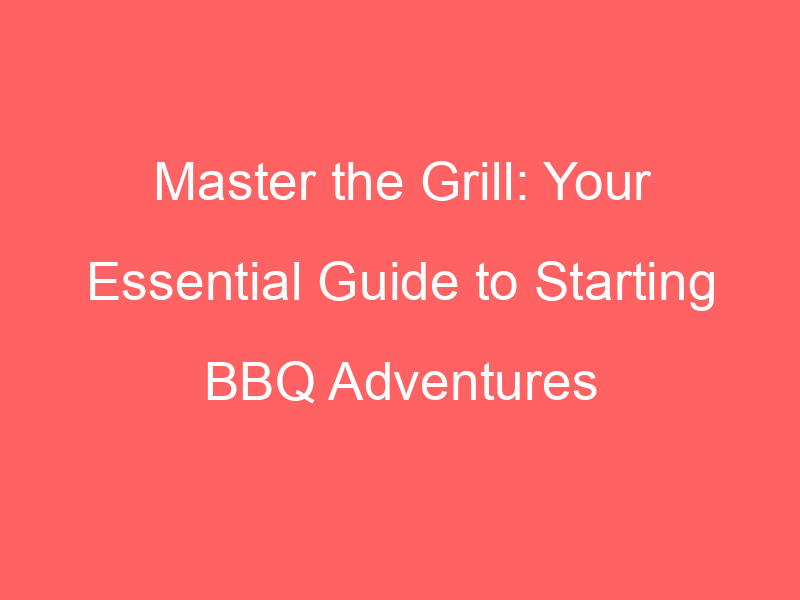Introduction to BBQ 101: Starting with BBQ
Welcome to the world of BBQ grilling! This is a journey that will tantalize your taste buds, challenge your cooking skills, and make your outdoor gatherings a hit. Let’s dive into why BBQ grilling is a must-try experience, understand the basics of grilling, and take the first steps towards becoming a grill master.
- Why BBQ grilling is a must-try experience
- Understanding the basics of grilling
- Getting started with grilling: First steps
BBQ grilling is not just about cooking food; it’s an experience. The aroma of the smoke, the sizzle of the meat, and the joy of cooking outdoors make it a unique culinary adventure. Plus, BBQ grilling allows you to experiment with different flavors and techniques, making each meal a creative endeavor. According to a survey, 75% of U.S. adults own a grill or smoker, indicating the popularity of this cooking method.
Grilling is a form of cooking that involves direct heat. The basics include understanding the different types of grills (charcoal, gas, electric), knowing how to control the temperature, and mastering the art of timing. For instance, high heat is great for searing meat and creating a crispy exterior, while low heat is ideal for slow cooking and smoking.
Starting with BBQ grilling can seem daunting, but it’s easier than you think. Your first steps should include choosing the right grill for your needs, learning how to safely light it, and understanding how to clean and maintain it. It’s also important to learn about different types of meat and how they should be cooked. For example, chicken needs to be cooked to an internal temperature of 165°F, while steaks are done at 145°F.
As we delve deeper into the world of BBQ grilling, we’ll explore more about setting up your grill, mastering basic grilling techniques, and avoiding common mistakes. So, put on your apron, fire up the grill, and let’s get started!
Setting Up Your New BBQ Setup
Setting up your new BBQ setup is an exciting task. It’s like opening a new chapter in your culinary journey. But before you can start grilling, you need to choose the right grill. Let’s dive into that.
Choosing the Right Grill
Choosing the right grill is a crucial step in setting up your BBQ setup. It’s like choosing the right tool for a job. Your choice of grill will significantly impact your grilling experience, the taste of your food, and even your safety. So, let’s explore the types of grills and the factors to consider when buying one.
- Types of grills: Pros and Cons
- Factors to consider when buying a grill
- Size: Choose a grill size that fits your space and grilling needs. If you usually grill for a large group, go for a larger grill.
- Material: Look for a grill made of high-quality materials for durability. Stainless steel grills are a popular choice.
- Features: Some grills come with extra features like a side burner or a warming rack. Consider if these features will be useful for you.
- Price: Grills come in a wide range of prices. Set a budget and choose a grill that offers the best value for your money.
There are three main types of grills: charcoal, gas, and electric grills. Each has its pros and cons.
| Type of Grill | Pros | Cons |
|---|---|---|
| Charcoal Grill | Offers a smoky flavor, high heat for searing | Takes time to heat up, requires charcoal |
| Gas Grill | Heats up quickly, easy to control temperature | May not offer the smoky flavor, requires propane or natural gas |
| Electric Grill | Convenient, easy to use, good for indoor grilling | May not offer the same flavor, requires electricity |
Choosing the type of grill depends on your personal preference, availability of resources, and your grilling environment.
When buying a grill, consider the following factors:
Remember, the best grill for you is the one that meets your specific needs and preferences.
Essential BBQ Grilling Tools
When setting up your new BBQ setup, having the right tools can make all the difference. Here are some essential BBQ grilling tools that you should consider:
- Grill Tongs: These are a must-have for any BBQ enthusiast. Grill tongs allow you to easily flip and move food around on the grill without getting too close to the heat. They are designed to give you a good grip on your food, preventing it from slipping and falling into the grill.
- Grill Brush: Keeping your grill clean is crucial for maintaining its performance and longevity. A grill brush is used to scrub off the residue left on the grill grates after cooking. It’s best to clean the grill while it’s still warm as the heat makes the residue easier to remove.
- Meat Thermometer: This tool is essential for ensuring your meat is cooked to the correct temperature. It takes the guesswork out of grilling and helps prevent undercooking or overcooking. Simply insert the thermometer into the thickest part of the meat to get an accurate reading.
- Grill Gloves: Safety should always be a priority when grilling. Grill gloves protect your hands from the intense heat of the grill. They are made from heat-resistant materials and are designed to provide a secure grip on your grilling tools.
These are just a few of the essential BBQ grilling tools that can help make your grilling experience more enjoyable and efficient. Remember, the right tools can make a world of difference when it comes to grilling. Happy grilling!
BBQ Grilling Guide: Basics of Grilling
Grilling is an art, and like any art, it requires a basic understanding of the tools and techniques involved. In this guide, we’ll focus on one of the most important aspects of grilling: heat management.
Understanding Heat Management
Heat management is crucial to grilling success. It involves controlling the temperature of your grill to ensure your food cooks evenly and thoroughly. There are two main methods of heat management: direct and indirect grilling.
- Direct vs Indirect Grilling
- How to Control the Heat on Your Grill
- Use a grill thermometer: This tool will give you a precise reading of the grill’s temperature.
- Adjust the air vents: Opening the vents will increase the heat, while closing them will decrease it.
- Move the food around: If some areas of the grill are hotter than others, don’t hesitate to move your food around to ensure even cooking.
Direct grilling involves placing the food directly over the heat source. This method is best for foods that cook quickly, like burgers and steaks. On the other hand, indirect grilling means the food is not directly over the heat source. Instead, the heat circulates around the food, similar to an oven. This method is ideal for larger cuts of meat that require longer cooking times, like roasts and whole chickens.
Controlling the heat on your grill is key to avoiding overcooked or undercooked food. Here are a few tips:
Remember, practice makes perfect. The more you grill, the better you’ll become at managing the heat and cooking your food to perfection. So, don’t be afraid to fire up that grill and start experimenting!
Mastering Grill Cleaning and Maintenance
Keeping your grill clean and well-maintained is crucial for its longevity and performance. Let’s dive into the details of how to clean your grill and why regular maintenance is so important.
- How to Clean Your Grill
Cleaning your grill is a simple process that can have a significant impact on the taste of your food and the lifespan of your grill. Here’s a step-by-step guide:
- Allow the grill to cool: After you’ve finished grilling, let your grill cool down. It’s safer and easier to clean when it’s not too hot.
- Brush off the grates: Use a grill brush to scrub off any leftover food particles on the grates. This will prevent them from sticking to your food the next time you grill.
- Wipe down the grill: With a damp cloth, wipe down the exterior of the grill to remove any dust or grime.
- Check for any damage: Regularly inspect your grill for any signs of wear and tear. This includes checking the grates for rust and the gas lines for any leaks.
- Cover your grill: When not in use, cover your grill to protect it from the elements.
- Importance of Regular Grill Maintenance
Regular maintenance of your grill is just as important as cleaning it. Here’s why:
- Improves food flavor: A clean grill means there’s no leftover residue to alter the taste of your food. This allows the true flavors of your BBQ to shine through.
- Extends grill lifespan: Regular maintenance can help prolong the life of your grill. By taking care of minor issues before they become major problems, you can save money on costly repairs or replacements.
- Ensures safety: Regularly checking your grill for any damage can prevent accidents. For instance, a gas leak can lead to a fire if not addressed promptly.
In conclusion, mastering grill cleaning and maintenance is essential for any BBQ enthusiast. Not only does it enhance the flavor of your food, but it also ensures the longevity and safety of your grill.
BBQ Grilling Techniques for Beginners
Grilling is an art that can be mastered with practice and patience. Whether you’re a novice or a seasoned griller, it’s always good to brush up on the basics. Let’s dive into some beginner-friendly techniques for grilling different types of food.
Grilling Different Types of Food
Grilling isn’t just about meats. Vegetables, too, can be transformed into delicious, smoky treats on the grill. Here’s a quick guide on how to grill meats and vegetables effectively.
- Grilling meats: Tips and tricks
- Grilling vegetables: A guide
Grilling meats can be tricky, but with a few tips, you can ensure a juicy, flavorful result every time. First, always preheat your grill. This helps to sear the meat quickly, locking in juices and flavor. Second, don’t flip the meat too often. Let it cook undisturbed for a few minutes on each side to develop a nice crust. Finally, let the meat rest for a few minutes after grilling. This allows the juices to redistribute throughout the meat, resulting in a more tender and flavorful bite.
Vegetables can be just as tasty as meat when grilled properly. The key is to cut them into uniform pieces so they cook evenly. Dense vegetables like potatoes and carrots should be parboiled before grilling to ensure they cook through. Lighter vegetables like peppers and zucchini can be grilled directly. Brush them with a little oil to prevent sticking and grill over medium heat until they are tender and slightly charred. Remember, different vegetables have different cooking times, so keep a close eye on them to prevent burning.
Grilling is a fun and rewarding way to prepare meals. With these tips and tricks, you’ll be well on your way to becoming a grill master. So, fire up that grill and start experimenting!
Marinating and Seasoning
Marinating and seasoning are two crucial steps in the BBQ grilling process. They not only enhance the taste of your food but also ensure that it remains juicy and tender. Let’s delve into these techniques.
-
How to Marinate for BBQ Grilling
Marinating is a process where you soak your food in a mixture of spices, herbs, and liquids. This not only adds flavor but also helps to tenderize the meat. Here’s a simple guide on how to marinate for BBQ grilling:
- Choose your marinade: A basic marinade includes an acid (like vinegar or lemon juice), oil, and your choice of herbs and spices.
- Marinate your food: Place your food in a zip-top bag or a shallow dish and pour the marinade over it. Make sure all parts are covered.
- Refrigerate: Let your food sit in the marinade in the refrigerator. The marinating time can vary from 30 minutes to 24 hours, depending on the type of food and the desired flavor intensity.
- Grill: Remove your food from the marinade and grill it to perfection. Remember to discard the used marinade to avoid cross-contamination.
-
Seasoning Tips for a Flavorful Grill
Seasoning is the process of adding salt, herbs, and spices to your food to enhance its flavor. Here are some seasoning tips for a flavorful grill:
- Season ahead of time: For best results, season your food at least an hour before grilling. This allows the flavors to penetrate deep into the food.
- Don’t be shy with your spices: A good BBQ requires a generous amount of seasoning. Don’t be afraid to experiment with different herbs and spices.
- Use high-quality salt: Salt is a key ingredient in any seasoning mix. Using high-quality salt can make a big difference in the taste of your BBQ.
- Apply seasoning evenly: Make sure to apply your seasoning evenly on all sides of your food to ensure a balanced flavor.
First Time BBQ Tips: Avoiding Common Mistakes
As a beginner, it’s natural to make a few mistakes when grilling. But don’t worry, we’ve got you covered. Here are some common pitfalls to avoid and tips to get it right the first time.
- Overcooking and undercooking: How to get it right
- Preventing food from sticking to the grill
- Managing flare-ups
One of the most common mistakes beginners make is either overcooking or undercooking their food. To avoid this, it’s crucial to understand the cooking times for different types of meat. For example, chicken takes longer to cook than beef or pork. A good rule of thumb is to use a meat thermometer to ensure your meat is cooked to the right temperature. For instance, chicken should reach an internal temperature of 165°F, while steak is done at 145°F.
Another common issue is food sticking to the grill. To prevent this, make sure your grill is clean and well-oiled before you start cooking. You can use a grill brush to clean off any residue and then apply a light coat of cooking oil to the grates. Also, avoid flipping your food too often. Let it sear properly on one side before turning it over.
Flare-ups can be a big problem, especially when grilling fatty foods. They can cause your food to burn and create a lot of smoke. To manage flare-ups, keep a spray bottle of water handy. When a flare-up occurs, spray a little water on the flames. However, be careful not to douse your food in water. Another tip is to keep a cooler part of the grill where you can move your food if a flare-up occurs.
Remember, practice makes perfect. The more you grill, the better you’ll get at avoiding these common mistakes. So, don’t be discouraged if your first few attempts aren’t perfect. Keep trying, and soon you’ll be a grill master!
Conclusion: Your BBQ Grilling Adventures Await
As we wrap up our comprehensive guide to BBQ grilling, it’s time to reflect on what we’ve learned and look forward to the exciting grilling adventures that lie ahead.
- Recap of BBQ grilling essentials
We started our journey by introducing you to the basics of BBQ 101, where we discussed the importance of setting up your BBQ setup correctly. We then moved on to the basics of grilling, where we highlighted the importance of understanding how to control heat and the role of different grilling techniques in achieving the perfect BBQ.
We also shared some valuable tips for beginners, including how to avoid common mistakes that could ruin your BBQ experience. We discussed the importance of preheating your grill, using the right amount of seasoning, and understanding when to flip your meat.
- Encouragement for the reader to start their BBQ journey
Now that you’re equipped with all this knowledge, it’s time to start your own BBQ grilling adventure. Remember, practice makes perfect. Don’t be discouraged if your first few attempts don’t turn out as expected. Keep trying, keep learning, and most importantly, keep enjoying the process.
BBQ grilling is not just about cooking food; it’s about creating memories with family and friends. So, go ahead, fire up that grill, and embark on a journey filled with delicious food and unforgettable experiences. Your BBQ grilling adventures await!






